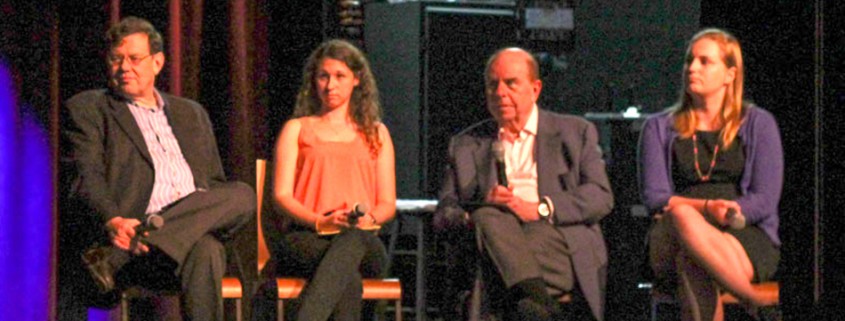Unruh Institute panelists discuss primaries’ results
The Jesse M. Unruh Institute of Politics brought in panelists to analyze the results of the New Hampshire primaries in real time Tuesday night at Tommy’s Place.
Panelists included Bob Shrum, a professor of political science and Carmen H. and Louis Warschaw Chair in Practical Politics, Henry Olsen, senior fellow at the Ethics and Public Policy Center, Samantha Archie of the USC College Democrats, and Leesa Danzek of the USC College Republicans. The panel was moderated by Dan Schnur, director of the Unruh Institute, and Jack Walker, news editor for the Daily Trojan.
Sen. Bernie Sanders won the New Hampshire Democratic primary with 59.6 percent of the vote. 58 percent of women voted for Sanders, while Clinton received 41 percent of women. Among young voters aged 18 to 34, Sanders got 87.5 percent of the vote while Clinton got 12 percent.
Shrum said that in order to experience further success in the primaries, both candidates need to be careful about how they present themselves.
“I think the most important case for the Democratic candidates is that we need to watch the speeches they say, whether or not they both give the same kinds of speeches,” Shrum said. “Hillary must give people a vision, articulate what people can relate to, not give a quasi-State of the Union, and not emotionally reach people, while Sanders must lay the groundwork for what the campaign has just said and involve themselves in a truly national campaign.”
Archie added she thought it was interesting to see such a highly contested Democratic primary.
“It’s an interesting night, it’s a different type of race and there is a divide between Democrats right now,” Archie said.
On the Republican side, Donald Trump won the primary with 34.5 percent of the vote, with several other candidates following him closely in the 10-16 percent range.
Olsen said that — despite Trump’s victory — his public persona will make it difficult to gain more support from people who don’t back him already.
“[Trump] is getting difficulty expanding his support because he inspires devotion and loathing in equal numbers, and you always see in the polls that he’s leading in numbers,” Olsen said. “If it was a yes-no for Donald Trump, it would be close to 50-50, and those who do not want to vote for Donald Trump — who tend to be highly educated and more moderate — are trying to settle who is better.”
Overall, Schnur noted that the voter turnout for young voters, especially for Sanders, was historic.
“87 percent of young voters from 18-35 are supporting Sanders,” Schnur said. “I would bet that back in the 2008 campaign, Barack Obama did not gain as much support from African-Americans compared to Sanders’ [support from young people] today.”
William Yelton, a senior majoring in film production, said he’s happy that Sanders won New Hampshire.
“I’m for Bernie Sanders all the way,” Yelton said. “USC has taught me to love people despite their religion, their sexuality, their gender, and both Clinton and Sanders support these people. However, Sanders has been supporting these people since day one.”
Aujenique Washington, a sophomore majoring in political science and an undecided voter, is also now leaning more toward Sanders.
“The part of Bernie’s campaign that intrigues me the most is that he’s very passionate about equality.” Washington said. “The most important part for that is to end institutional racism, even though it’s difficult, Bernie Sanders wants to combat it.”

